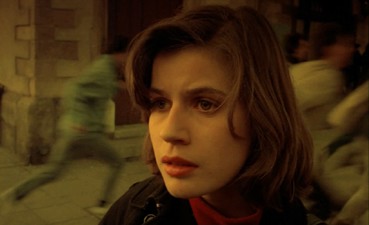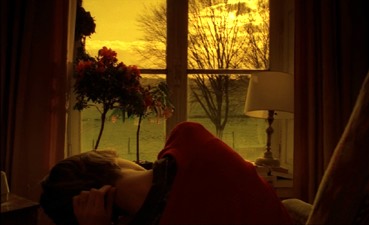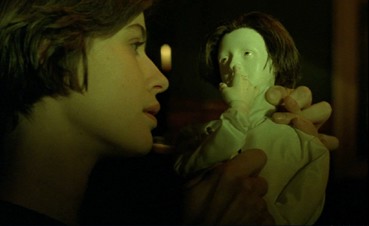|
I
have for some time been intrigued by the notion that if
you dispense with the spiritual concept of the soul, then
a biological explanation is required to explain the experience
of individual consciousness. The theory suggests that what
puts me inside this body and everyone else outside of it
is a unique alignment of genetic, biological and electro-chemical
conditions, or at least almost unique. The law of averages
suggests that no matter how complex these conditions are,
eventually, inevitably, they will reoccur, and you thus
effectively have a form of reincarnation. Given the very
specific nature of the biological conditions required effect
this condition, the likelihood is that this biologically
reincarnated being would bear a striking similarity to the
one that preceded it, both physically and in aspects of
their personality. But the most interesting element of the
theory concerns the possibility, especially as the world
population increases, that sooner or later these biological
conditions will occur in two places simultaneously, which raises the question of
just what that would mean for the experience of consciousness
for the affected person.
I
shudder to think what Hollywood would do with the concept
of two people of similar name and identical appearance born
at the same time in different countries – a mistaken identity
plot involving shifty Russian agencies and CIA operatives
no doubt, and the two central characters would have to be
radically different in personality, the meek librarian forced
to flee when they are mistaken for the ruthless assassin.
And it would be revealed in the end that they were actually
related, separated at birth by a cruel twist of fate. Oh
lordy. But
in the hands of Polish maestro Krzysztof Kieslowski it forms
the core of one of his most enigmatic, mysterious and beautiful
films, and one in which the storyline is subservient to
character and a fascination with life's small but precious
moments.

This
is first realised in the early close-up of the initial central
character Weronika, singing her heart out as part of a group performing in the open air
that disperses the moment that rain begins to fall. All
except Weronika, for whom the sensation of rain on her face
appears every bit as joyous as the music that we learn
is central to her world. A singer of considerable talent,
she is on the first rung of a possibly successful career
when, at her first major public performance, she has a heart
attack and dies.
Over
in France, meanwhile, a woman of identical age and appearance
named Véronique works as a music teacher and also
has the talent to become a professional singer, but something
is holding her back. Could it be her concerns over the results
of her recent electrocardiogram examination, the fear of a heart attack
combined with an inexplicable sense of loss she has recently
begun to experience? Kieslowski keeps the parallels between
the two lives largely subtle, the small sparks in the
first third of the film intermittently resonating in longer
midsection, suggesting an almost supernatural connection
of the sort often associated with twins, one stepped up
a gear by Weronika's untimely death.
The
two never meet, but come aching close to doing so early in the film
in an electrifyingly staged sequence in which Weronika catches
sight of a tourist coach that is being boarded by her doppelganger, who cheerily takes pictures through its window as it departs,
unaware that she has captured an image that will later haunt
her. This moment provides a springboard for a number of
only hinted-at connections between the two, but also a rationale
for them owning the very same clear plastic ball, something
they no doubt bought in the same Polish city. This jointly
owned object becomes at one point almost a memory conduit,
when images distorted through Weronika's ball and the flawed
window on the train in which she is travelling later find
a home in Véronique's troubled subconscious.
An
intriguing development in itself, Véronique's fascination
with a puppeteer who visits her school and the games he
plays to draw her to him provide the most literal recognition
of the parallels between the two lives. This is first realised through a
marionette show that almost mimics Weronika's on-stage death,
and later with the suggestion of a new work using dolls
that have been modelled directly on Véronique, which perhaps spells
things about a little too literally for an audience that
should really be able to put the pieces together themselves.

The
plot takes us nowhere conclusive, but this curiously never
seems to matter. Get two or three fans of the film together
and they talk primarily not of narrative but of their delight
at specific moments – the near meeting of the two women,
the subjectively shot heart attack, the post-death out-of-body
flight over the audience, the church distorted by a train
window, the reflected light that dances around Véronique's
room, the tape that tells a story through sounds and ends
in possible death, Véronique's first face-to-face
encounter with her own marionette... I could go on and on.
Really.
In
the dual central role of Weronika and Véronique,
Irène Jacob is positively radiant, capturing the
love of life that unites both characters and their subsequent
physical and mental pain with spellbinding conviction – just thinking about her expression of unbridled joy in her
close-up as Weronika as she sings in the rain (no film pun intended)
makes the hairs on my neck bristle. And as has been almost
relentlessly documented, this was a transitional film for
Kieslowski, the dual locations and languages marking his
move from the socially and politically influenced
Polish films to the lyrical Three Colours trilogy he was soon to make in France, films with which Véronique shares
stylistic and thematic ground.
As ever, it's not going to work for
everybody, and with its opaque storytelling, its focus on
the small detail at the expense of the big story and its
heavily tinted visuals, it will provide plenty of ammunition
for the anti-art house crowd. But for those open to the
idea of cinema as more than just a vehicle for a rattling
tale, as a tool for the expression of emotion through visual
and aural experience, The Double Life of Véronique is a work that absolutely has to be experienced, appreciated,
and cherished.
Artificial
Eye have clearly licensed this two-disc package from the
French MK2 release, and thus it is they who deserve the
largest slap on the back for this lovely transfer, which
copes with the film's heavy tinting handsomely and demonstrates
exceptional contrast and levels of detail. It really does
look better than I've ever seen it outside of the cinema – only in one night time shot were compression artefacts
obviously visible. The picture is framed 1.66:1 and anamorphically
enhanced.

When
we screened the film print almost ten years ago (was it
really ten years?), I was particularly struck by the extraordinary
quality of the sound mix. I'm not talking flashy use of
surrounds, but the sheer clarity and fidelity of the sound
in many of the scenes – it remains one of the best soundtracks
I have ever heard in a cinema. It was no small joy to have
that experience repeated here. The Dolby 2.0 stereo track
is very impressive, but the 5.0 track is the one to go for
to really recreate the cinema feel, with key sequences – Weronika walking out into the square and colliding with
a passer by, the tape she is sent as a clue to a proposed
meeting, her arrival at the railway station at which this meeting
will take place – sounding absolutely gorgeous, with the
surrounds nicely used for complete emersion in the life
and activity of the locations. An excellent job.
Also
licensed from MK2, the extras are all on disc 2 and will
prove priceless to anyone interested in the cinema of Krzysztof
Kieslowski, which frankly should include anyone who really
cares about cinema. All have optional French or English
subtitles.
Conversation
with Kieslowski (52:40) was made in 1991 for
French TV and is structured around an extensive interview
with the director and invaluable behind-the-scenes footage
of the filming and editing of The Double Life of
Véronique. Kieslowski discusses some of
the themes of the film (though not, thankfully, in overly
explicit detail), the collaborative approach with his regular
co-scriptwriter Krzysztof Piesiewicz ("Piesiewicz cannot
write but he knows how to tell a story"), his decision
to abandon documentary for fictional features and how that
has affected his approach to film-making ("Everything
has to be fake in order to look real on screen"), his
own early influences and his experiences with Polish
censorship. One of my favourite sequence reveals how the
out-of-body shot was done. There are a lot of extracts from
the film included, usually to illustrate points under discussion.
Interview
with Irène Jacob (16:42) is shot largely
in one big close-up, only briefly interrupted by very short
extracts from the film. The actress is very talkative about
the landing and preparing for the dual role and working
with Kieslowski, who encouraged her to create specific mannerisms
for each character in order that the audience recognise
subtle differences between them. She also hints and a fair
amount of footage that was shot but cut from the final edit
of the film.
Kieslowski,
Polish Film Maker (30:35) provides a very
dry but detailed history of modern Polish cinema and specifically
Kieslowski, through his early documentary work through to
his later features. At times it has the feel of a French
Open University programme, with phrases like "Let us
look at these two films in more depth," followed by
a film school style analysis of particular scenes. But it
IS interesting.
The
final section, Short Films, contains
four such works spanning 22 years. The 1958 The
Musicians (10:07), a simple but acutely observed
record of steelworker orchestra in practice, was directed
by Kazimierz Karabasz, who taught Kieslowski at the Lodz
Film School in the 1960s. The film was a big influence on
Kieslowski's own documentary work and was one of his top
ten films. The 1970 Factory (Fabryka 17:30) was one of the first films made by Kieslowski on
leaving film school and the influence of The Musicians can be clearly seen in this intriguing observational look
at the problematic discussions between workers and managers
at a Polish factory that acts almost as a microcosm of the
problems inherent in the Polish political system of the
era. Kieslowski's 1976 Hospital (Szpital 20:28) covers a single 24 hour shift on a wing at a busy
hospital and can't help but have a ring of Frederick Wiseman
about it, echoing that director's own 1970 film of the same
name. The 1980 Railway Station (Dworzec 2:42) was one of the final two films Kieslowski would make
for the WFD studio, for whom he did most of his early documentary
work. Each of the films has a useful textual introduction
(in French with English subtitles) and are framed 4:3.
It's
difficult to be objective about a film that provokes such
a personal response as this one, and I don't feel inclined
to try. The Double Life of Véronique is never going to connect with an audience who like their
stories loud and obvious and with a clear conclusion, but
I, frankly, could care less. For my money this is one of
the most beautifully realised works by one of cinema's true
artists, a film that stimulates the intellect but also touches
the heart. And how.
Artificial
Eye's 2-disc DVD release, licensed from the French MK2,
is bloody marvellous, the superb picture and sound supplemented
by a very classy and well chosen set of extra features.
Very highly recommended.
|